


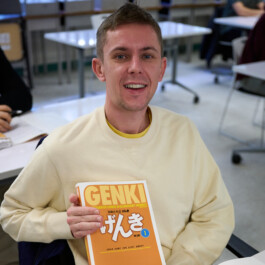
Students will complete the elementary to intermediate level study of Japanese in “Genki 1 & 2” followed by “An Integrated Approach to Intermediate Japanese”.
The aim of this course is to develop the four basic language skills: reading, writing, listening and speaking in order to cultivate a foundation of Japanese language ability.
Emphasis is placed on balancing skills in accuracy, fluency and complexity.
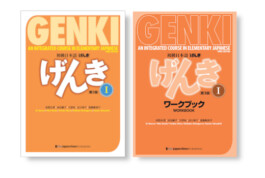
Textbook: Genki 1 (3rd Edition) Lesson 1-6
This class is for first-time learners, former students who would like to repeat the class, and students who have not reached the Adult B level.
By the end of this course you will be able to:
・Introduce yourself
・Order food in a restaurant
・Extend /accept/turn down invitations
・Ask and describe the location of a buildings, things, people, events
・Speak and write your background and experiences in simple sentences
・Read and write hiragana, katakana and 58 kanji
Textbook: Genki 1 (3rd Edition) Lesson 7-12
By the end of the course, you will be able to:
・Describe a person’s physical attributes
・Combine two and more adjectives to make a long sentence
・Speak in an informal manner to your friends
・Make a polite request
・Compare things to each other
・Express your intentions for the future
・Describe two or more activities and events you did or currently do
・Describe your past experiences
・Provide advice
・Make a guess or prediction
・Read and write 102 new kanji
Upon completion of Adult B, students will have reached the JLPT N5 level of proficiency in Japanese.
Every journey begins with a first step.
See what students can do in our Adult A courses:
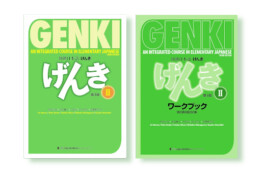
Textbook: Genki 2 (3rd Edition) Lesson 13-18
By the end of this course you will be able to:
・Answer questions in a simple job interview
・Provide advice
・Describe give/receive gifts
・Describe people’s kind acts
・Make travel plans
・Politely ask someone for afavor
・Learn and practice a more casual speech style
・Describe the actions you did in the past and which ones you regret
・Describe your previous actions
・Express conditional sentences
・Describe the actions you perform simultaneously
・Read and write 94 new Kanji
Textbook: Genki 2 (3rd Edition) Lessons 19-23
By the end of the course, you will be able to:
・Use honorific expressions
・Describe an action that is easy or difficult to perform
・Create passive sentences
・Describe your wishes for someone
・Create causative sentences
・Create causative-passive sentences
・Create command sentences
・Create conditional dependence sentences
・Read and write 77 new kanji
Upon completion of Adult D, students will have reached the JLPT N4 level of proficiency in Japanese.
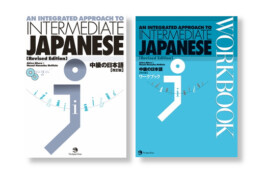
Textbook: An Integrated Approach to Intermediate Japanese Lesson (Revised Edition) Lesson 1-5
This intermediate course offers practical communication practice to build students’ ability to converse and discuss on a wide range of topics – around realistic content and functions and natural Japanese. In addition to refining communication skills developed all four language skills: speaking, listening, reading and writing at the intermediate level, students will also learn higher-level grammatical structures and expressions and acquire the skills needed to discuss events not only in immediate, familiar situations, but also in communities and society. Students will also learn 197 new kanji.
Textbook: An Integrated Approach to Intermediate Japanese Lesson (Revised Edition) Lesson 11-15
This intermediate course offers practical communication practice to build students’ ability to converse and discuss on a wide range of topics – learning realistic content and functions, and natural Japanese. In addition to refining communication skills developed all four language skills: speaking, listening, reading and writing at the intermediate level. Students will also learn higher-level grammatical structures and expressions, acquire the skills needed to discuss events not only in immediate, familiar situations, but also in communities and society. Students will learn 178 new kanji.
Upon completion of Adult G, students will have reached the JLPT N3 level of proficiency in Japanese.
See the progress of our Adult F course students:
Textbook: An Integrated Approach to Intermediate Japanese Lesson (Revised Edition) Lesson 6-10
This intermediate course offers practical communication practice to build students’ ability to converse and discuss on a wide range of topics – learning realistic content and functions, and natural Japanese. In addition to refining communication skills developed all four language skills: speaking, listening, reading and writing at the intermediate level. Students will also learn higher-level grammatical structures and expressions, acquire the skills needed to discuss events not only in immediate, familiar situations, but also in communities and society. Students will learn 169 new kanji.
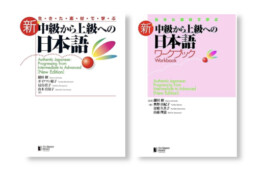
Textbook: Authentic Japanese: Progressing from Intermediate to Advanced (New Edition)
Congratulations on reaching the next level in your Japanese language journey! As you continue to advance, our program offers tailored pathways to help adult learners smoothly transition from intermediate to advanced proficiency to aim for the JLPT level N2.
At this stage, our curriculum focuses on refining your linguistic skills to tackle more complex grammar structures, expand your vocabulary, and enhance your comprehension abilities. Through immersive exercises, engaging activities, and culturally-rich content, you’ll deepen your understanding of Japanese language and culture.
By integrating natural pronunciation and intonation into our curriculum, we ensure that you not only achieve proficiency in Japanese language skills but also sound and feel like a confident, native speaker. We’re excited to help you unlock your full potential and reach your language learning goals.
Interview of our Adult Advanced students:
| Schedule | 10 month program (Sept 6, 2025 – June 13, 2026)
| ||||||||||||||||||||
| Fees | Registration is now open for the 2025-2026 school year, beginning in September 2025. Administration Fee: $58 Facility Improvement Fee: $28 Annual Tuition Fee (please choose from): a. One-time payment $1,078 [e-transfer or cheque only] b. Monthly payment $112.20 [credit card only]: the monthly payment will be automatically charged monthly to a designated credit card. |

Intermediate to advanced Japanese level is required for all extracurricular classes.
A “letter” is not just a sign or character. It is a tool that can describe feelings and scenery, and that represents culture in its own form. Japanese has a lot of beautiful words, and uses three separate alphabets: Hiragana, Katakana and Kanji to express culture through letters – an art in themselves. Calligraphy is to imbue letters with the meanings the words have, and the feelings you want to express, using a writing brush and ink. I feel joyful when the letters I painted with the brush speak to someone in a way that goes beyond the words. Through calligraphy, let’s learn and feel Japanese letters, words, and culture.
| Schedule | 10 month program (Sep – Jun) Extracurricular (Optional): 3:10pm – 4:10pm Classes begin on Sept 7, 2025 |
| Fees | $47 per month |
Registration information will be shared through our e-news (subscribe here).
487 Alexander St
Vancouver, BC
V6A 1C6 Canada
1-604-254-2551
info@vjls-jh.com
• Building Status
• Withdrawal & Absence Forms
• Annual Calendars
Site by Daniel